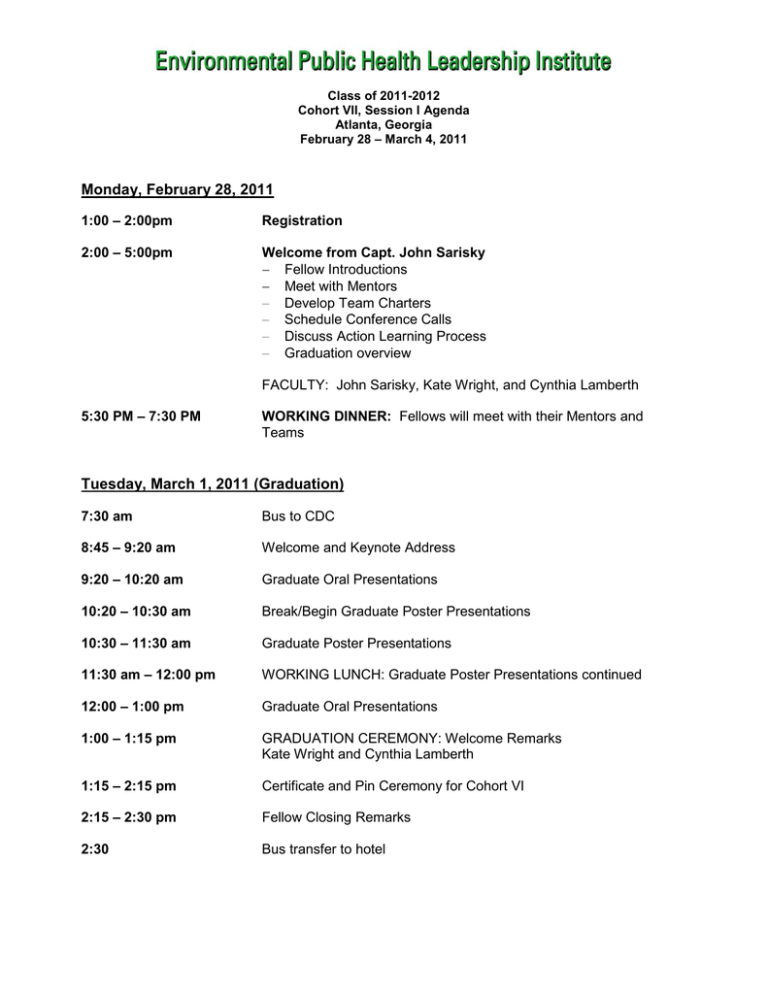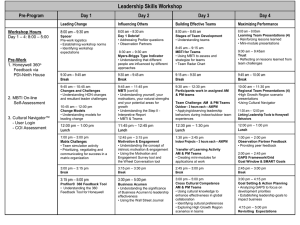Monday, February 28, 2011
advertisement

Class of 2011-2012 Cohort VII, Session I Agenda Atlanta, Georgia February 28 – March 4, 2011 Monday, February 28, 2011 1:00 – 2:00pm Registration 2:00 – 5:00pm Welcome from Capt. John Sarisky − Fellow Introductions − Meet with Mentors − Develop Team Charters − Schedule Conference Calls − Discuss Action Learning Process − Graduation overview FACULTY: John Sarisky, Kate Wright, and Cynthia Lamberth 5:30 PM – 7:30 PM WORKING DINNER: Fellows will meet with their Mentors and Teams Tuesday, March 1, 2011 (Graduation) 7:30 am Bus to CDC 8:45 – 9:20 am Welcome and Keynote Address 9:20 – 10:20 am Graduate Oral Presentations 10:20 – 10:30 am Break/Begin Graduate Poster Presentations 10:30 – 11:30 am Graduate Poster Presentations 11:30 am – 12:00 pm WORKING LUNCH: Graduate Poster Presentations continued 12:00 – 1:00 pm Graduate Oral Presentations 1:00 – 1:15 pm GRADUATION CEREMONY: Welcome Remarks Kate Wright and Cynthia Lamberth 1:15 – 2:15 pm Certificate and Pin Ceremony for Cohort VI 2:15 – 2:30 pm Fellow Closing Remarks 2:30 Bus transfer to hotel Wednesday, March 2, 2011 8:00 – 9:00 am EPHLI History and Vision, CDC Initiatives, Projects and Outcomes FACULTY: John Sarisky 9:00 – Noon Myers Briggs Trait Inventory (MBTI) Self-Assessment Results, Skillscope 360 Assessment Survey and Individual Development Plan (IDP) FACULTY: Nancy Tolliver Results of MBTI Interpreting Your MBTI Results Where You Get Your Energy How You Gather Information How You Make Decisions How You Relate to the Outside World SKILLSCOPE 360 ASSESSMENT SURVEY: Who Was Invited to Complete the Skillscope Results and Feedback of the Skillscope INDIVIDUAL DEVELOPMENT PLAN (IDP): Identification of Leadership Skills in Which to Improve Linking Leadership Skills to MBTI and Skillscope Assessments Why Choose One on One Coaching Noon – 1:00 pm WORKING LUNCH: Fellows meet in teams to discuss their IDP results and next steps in plan development 1:00 – 5:00 pm Introduction to Organizational Learning & Leading Systems Change FACULTY: Sherry Immediato and David Stroh Five disciplines of organizational learning Systems Thinking: The Fifth Discipline Creative Tension Alignment vs. Agreement The Role of Leaders in Establishing and Managing Creative Tension A Four-Stage Change Model EPHLI Projects and Top Ten Performance Issues FACULTY: Sherry Immediato and John Sarisky Environmental Public Health Performance Standards FACULTY: John Sarisky Background on the EnvPHPS Relationship to the National Public Health Performance Standards (NPHPS) and Accreditation Benefits of using the EnvPHPS – Results from the Field Case Study on Performance Standard #1 Results from the Assessments and Summary Overview Comparison of Aggregate Data with Individual Fellows’ Data Thinking About Your Leadership Project FACULTY: Sherry Immediato, David Stroh, and John Sarisky Thursday, March 3, 2011 8:00 am – 12:00 pm Systems Thinking FACULTY: David Stroh and Sherry Immediato Distinguishing Traditional From Systems Thinking o Case: Waters of Ayole (video) Building the Foundation for Change Choosing Your Leadership Project o Clarifying the role of Environmental Standards in your project Facing Current Reality: The Iceberg A Simple Tool for Clarifying Current Reality Steps of a Systems Thinking Analysis Using the Iceberg Clarifying Your Story, Patterns of Behavior, and Focusing Question Exercise: Applying These Guidelines to Your Project 12:00 – 1:30 pm WORKING LUNCH: Team Meeting with Mentors Mentors Depart after Team Meeting 1:30 – 5:00 pm The Basic Language of Systems Thinking Reinforcing Loops o Case: Managing the Lily Pond Balancing Loops o Three Simple Challenges in Achieving Goals o Exercise: Clarifying One Systemic Challenge in Achieving Your Project Goals Case: Managing Budget Pressure The Power of Systems Archetypes Fixes That Backfire and Shifting the Burden o Exercise: Identifying a Possible Fix that Backfires/Shifting the Burden Dynamic Friday, March 4, 2011 8:00 – 12:00 pm Systems Thinking continued Additional Archetypes: Limits to Success and Accidental Adversaries Expanding and Linking Causal Loop Diagrams The Impact of Mental Models on Systems Performance Building Support for Your Analysis Making an Explicit Choice: Clarifying Your Intended Purpose Bridging the Gap o Identifying Leverage Points o Staying on Course and Learning from Experience Summary: How Systems Thinking Facilitates Change Q&A and Next Steps 11:30 am – 1:30 pm WORKING LUNCH: Complete Post Session Evaluations and discuss next steps with Team members


